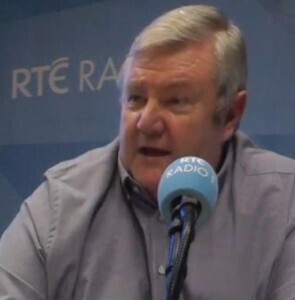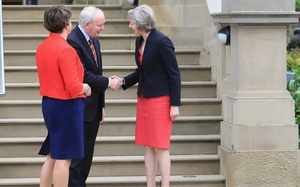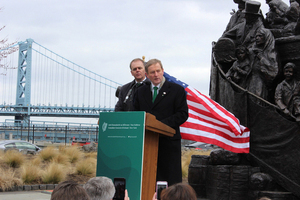From top: Fianna Fáil Senator Lorraine Clifford Lee (third right) with party workers canvassing in Swords, County Dublin for the Fingal by-election, which is being held this Friday; Derek Mooney
Shortly after he was appointed Conservative Party chairman, Kenneth Baker was presented with internal polls showing the Tories facing near annihilation in the following year’s Local Elections (1990).
The Poll Tax recently introduced by the Tories was not just unpopular, it was hated. There were angry, mass anti-poll tax protests across the UK, in the run-up to the May 3 polling day. The biggest, in London, turned into a riot with over 300 arrested and 113 seriously injured.
Against this febrile background and with the knowledge that the Tories were going to lose big, Baker set about putting one of the finer political skills into operation: he managed expectations.
Polls were leaked showing the Tories likely to do considerably worse than expected. They even suggested that Tory London council strongholds such as Westminster and Wandsworth were in jeopardy.
When, on the day, the Tories seemed to confound their worst expectations, keeping seat losses to under 240 and comfortably holding their London strongholds, Baker declared it a huge win.
His strategy of putting media focus on Wandsworth and Westminster worked masterfully. Tory newspapers hailed it as a major win.
It is hard not to detect a whiff of the auld “Ken Bakers” about the curious emergence, over the weekend, of predictions claiming that Fianna Fáil might win all four by-elections being fought this Friday.
Maybe it’s the cynic in me, but I cannot help thinking that someone, somewhere is trying to prepare the ground for a post by-election analysis focused more on why Fianna Fáil didn’t win all four, than on why Fine Gael could only win one – or none?
It is ironic that the media interest in the by-election results will be higher than it was in the campaigns themselves.
If it wasn’t for the controversy raised by two of the candidates, via racist comments or dubious twitter archives, would anyone outside the four constituencies know there were by-elections? Indeed, are many within them especially exercised about them?
This is curious as wins by Labour, Sinn Féin, Greens, independents or by parties other than Fianna Fáil or Fine Gael could bring down the government (assuming any Inds elected would not join Confidence and Supply).
Donning my punditry mantle, my own best guess at to the outcomes, offered with the obvious health warnings that: (a). I am a Fianna Fáil hack and (b). there are still four campaigning days left, is that Fianna Fáil is likely to win two of the four contests: via Pádraig O’Sullivan in Cork North Central and Malcolm Byrne in Wexford and that two Dublin seats will probably go to a Green and an Independent
Despite a shaky start, Fianna Fáil’s Lorraine Clifford-Lee will be in the hunt in Dublin Fingal, but it still looks like the Green candidate will win here, though Labour is also said to be doing well.
Fine Gael’s lone hope of a win could be with its Dublin Mid-West candidate. She is fighting hard to hold the seat previously held by Frances Fitzgerald MEP – but it will be an uphill slog.
There are several strong contenders in Mid-West, including Sinn Féin’s Mark Ward, Fianna Fáil’s Cllr Shane Moynihan, Paul Gogarty, once a Green TD now running as an Ind, Labour’s former TD Joanna Tuffy and the SocDem’s Anne Marie McNally (also of this Broadsheet parish). My money has been on Gogarty since the start and it stays there.
When looking at any of the by-elections you have to remember that in eight out of the past 12 by-elections the winner was the one who topped the poll on the first count. In the other four, the eventual winner came second on the first count, but was sufficiently close to the poll topper to be able to pull ahead on transfers.
This will be a big factor in both Dublin Fingal and Dublin Mid-West, where the first count gaps between the top two, three or even four candidates may not be so wide.
So much for the punditry. Looking at the campaigns themselves, especially the week-long tumult over Fine Gael’s Wexford candidate, one has to wonder if political parties, as structured entities, understand their roles?
As any first-year political science student could tell them, candidate selection is one of the primary functions of a political party. This includes the vetting and preparation of candidates.
We know that the two main parties do a lot of constituency polling, but it is shocking to hear, as the Taoiseach admitted, they do not vet or do basic oppositional research?
Is nobody inside Fine Gael HQ capable of doing a simple Google search, just to see what is out there on the net about their candidate… or, is Google search solely reserved for policy development?
Perhaps I should not whine about this too much. There is obviously a business opportunity here and I am sure I could be persuaded to provide this commercial service, to any party serious about preparing its candidates.
Here, as a free sample, is an initial piece of advice I would give to any candidate: get someone with critical sense to check over your social media archive at regular intervals.
If you have posted some major crap then, doubtless, someone has it screen captured and saved, ready to roll it out when it will do you the most harm. So, you should, at the very least, be well prepared for that.
My final point today, is about by-elections themselves. Are they a fair way to fill casual vacancies that arise during the lifetime of the Dáil?
To be fair, by-elections are a lot fairer now than they were. Electoral law was changed in 2011 to create a six-month deadline in which vacant seats must be filled.
This followed the 2010 High Court case taken by Sinn Féin compelling the faltering Fianna Fáil/Green government to finally hold the Donegal South West by-election to fill the vacancy created – almost 18 months earlier – by Pat ‘The Cope’ Gallagher’s election to the European Parliament.
The loss of The Cope’s seat along with the loss of three other Fianna Fáil seats helped herald the end of the 2007 Fianna Fáil/Green government – or at least made its continuance problematic.
(The other three seats were: Seamus Brennan, who tragically died in July 2008, his seat was won by Fine Gael’s George Lee at the June 2009 by-election; Martin Cullen resigned as a Minister and TD in March 2010 and Jim McDaid resigned as a TD in November 2010. Neither of these two by-elections were held).
The question is: should a government with a narrow majority potentially fall due to casual vacancies rather than a specific political action or movement?
Losing a Council or European election, both of which are conducted nationally, does not precipitate a government collapse – though it can have long term political implications – so, why should [a] by-election[s] in individual constituencies, particularly those occasioned by the death of a TD, potentially have that effect?
The Constitution says, at Art 16.7, that the “…filling of casual vacancies, shall be regulated in accordance with law”, so this is not a matter requiring a referendum.
I suppose the issue is what mechanism you use instead of a by-election? Should we use the replacement list system used in the European Parliament to fill casual vacancies – but then how do you define a casual vacancy?
Should we differentiate between resignations due to ill health and those made as a political protest. If we were to have replacement lists, should the resigning TD have the right to invoke a specific legislative clause to trigger a by-election to show their resignation was a deliberate act?
In the greater scale of things, these are not pressing reforms, just thoughts prompted by Friday’s votes. To borrow the meaningless Boris phrase, this is not a question over which I am willing to die in a ditch.
In the meantime, if you happen to live in Dublin Mid-West, Dublin Fingal, Wexford or Cork North Central do go out and vote on Friday – decisions are made by the people who show up.
Derek Mooney is a communications and public affairs consultant. He previously served as a Ministerial Adviser to the Fianna Fáil-led government 2004 – 2010. His column appears here every Monday.Follow Derek on Twitter: @dsmooney








Think Mid-west is Gogarty or Mark Ward (via transfers), McNally in with a shout but dont think she has the base support this time around. FG wont get a sniff of Frances Fitzgeralds seat (ewww!). Cannot see Moynihan doing anything here ..his transfers will be important though. Outside bet to come close will be Kellie Sweeney (PbP) but again it will be her transfers that will be key…
We got 4 polling cards in the post early this morning
That’s 4 votes that will be loaned to the Green party candidate here in Fingal
Thanks Derek
You should thank that FF party member and troll over on theJournal, Stephen Kearon, for his services and bravery in online commentary – Social Media Lessons from FF my a*se
I watched RTE reporting from swords last week on six one and although the commentator (hugh whatshisname) said Green or Labour should take the seat he constantly mentioned how well FF should do in that in fingal (not one mention of FG for the time) I just found it a bit weird he talked some much about how well FF will do but then came to the conclusion that Labour or the Greens will win.
https://www.independent.ie/irish-news/politics/forty-minutes-in-wexford-varadkar-hits-the-campaign-trail-with-verona-murphy-but-doesnt-stick-around-or-answer-questions-38724665.html
The leader of the ‘No questions please, I’m racist” party subdued in Wexford. Photo Op meets Photoshop.
Verona Murphy lobbies the Government on behalf of the IRHA. But is that actually legal, as she’s a politician herself? Lobbying the government which is made up of the parts she’s a member of?
Bye-election voters should plump for the loosest loose cannon candidates and defy the MSM pundits.
Fianna Failure roots for Fianna Fail (I know how to make a fada). Yawn.